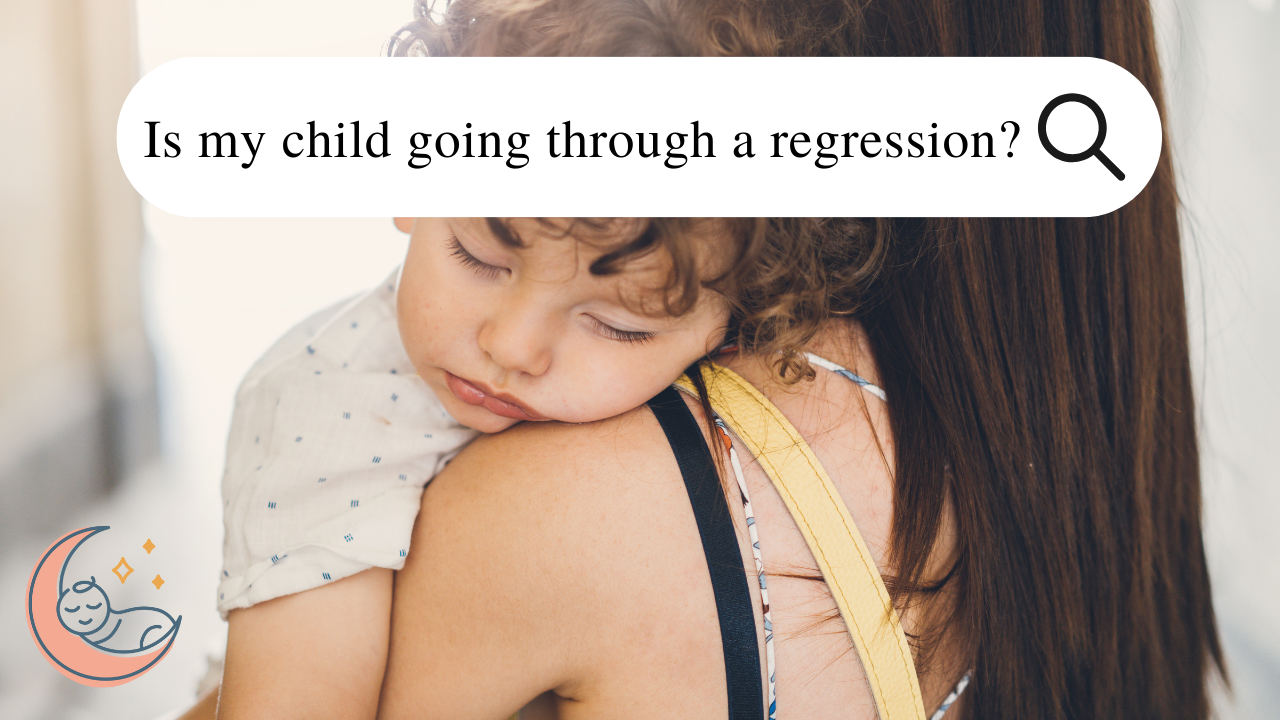Is my child going through a SLEEP REGRESSION?
Nov 01, 2021

My name is Mica. I am a certified sleep consultant and founder of Rested Mama, Happy Baby. I help families on their journey to establish healthy sleep habits and get the whole family sleeping again!
We hear this scary term all the time related to our babies’ sleep. REGRESSION. The dreaded regression causes concern and anxiety for some parents, even though it’s totally a PROGRESSION of your child’s developmental milestones. Regressions can also vary, but in general, they happen around the same age and exhibit some very specific symptoms. Many times, however, those regressions can look a lot like impacts from overstimulation, growth spurts, or a combination of all of the above. Many of my families end up asking me the question, how do I know if my child is going through a regression?
What is a Regression?
A sleep regression is a point in time in your child’s development that is usually impacted by a combination of nap transition and new cognitive and physical motor skills. These milestones often then impact sleep which starts to peak at 4 months, 8 months, 12 months, 18 months, and 24 months of age. The change in sleep needs and the new skills your child develops can rear its head by causing some excitement including:
- Increased middle of the night wakings
- Change in feeding habits
- Trouble falling asleep
- Increased crankiness
- Difficulty at nap time
- Short naps
Although, there are other factors that can also cause these same disruptions such as growth spurts, teething, changes in routine, transitions such as daycare, stimulation or busy days, as well as overtiredness and sickness. So how will you know the difference? Keep reading!
3 Questions to Determine a Regression from Another Disruption
1. Is my child around the same age range (gestationally) when regressions typically occur? If the answer is yes, it’s highly likely you are experiencing a regression, but this may not be the only indication.
2. Has my child been experiencing or exhibiting new skills such as sitting up, rolling back and forth, standing up, crawling, or waking? There could be other skills such as grasping or use of hands or even language development. This is a huge indicator that you are likely hitting a regression.
3. Does this change in sleep behavior seem to linger after 3 days? Overstimulation can definitely cause a wrench in sleep routine but is often reversed within a day or two of getting back on schedule. Regressions, on the other hand, can last for weeks. If you are experiencing a sudden, and what seems like a “permanent” change, it is highly likely you are in the midst of a regression.
If you have answered yes to all these questions, then you are definitely in a regression. Don’t fret, though! While you cannot avoid a regression completely, there are a ton of ways you can manage through it. With the exception of the 4-month sleep regression, all other regressions are temporary and can be managed.
How to Manage Regressions:
1. Let Sleepy Cues Drive Wake Times
Letting your child’s sleepy cues drive your wake time and schedule to get them as much sleep as possible! Why? We don’t want an overtired child, and guess where they develop the mastery of these great new skills? Yup! While they are sleeping! Naps are a crucial part of development and ensuring great naps and lots of good sleep will help them master the skills, and thus, get them past the regression.
2. Be Consistent:
Be consistent with your healthy sleep habits! While your child’s sleep may regress, that doesn’t mean your sleep routine and habits should regress. This is where most families end up regressing permanently. Routine and independent sleep skills get put on the back burner and all of a sudden you find yourself wrangling with sleep regression lasting longer than a few weeks.
3. Practice the Pause:
Practice your pause in the middle of the night! There could be lots of disruptions and wakings at night, but before you run in, make sure you watch, monitor, and listen to what your child might be experiencing. You may be surprised that after a few minutes, they go right back to sleep!
4. Sleep Training:
Another great way to manage through the regression is through sleep training! There are many methods to this, not just Cry-it-Out, but helping your child develop independent sleep skills and encouraging these skills can also help them navigate through this time and get MORE sleep that they need.
Feel like you are at your end, and just want to get some help? Don’t worry, I am here for you! I have a ton of resources from classes, to group coaching, to 1:1 packages that help get families sleep in just a couple of weeks. Feel free to schedule a chat here and see which program works for you!
Learn more about how we work with families to help their babies sleep 10+ hours at night without Cry-it-out or Ferber. Join our free webinar!
Rested Mama, Happy Baby Founder
Want to learn more about our approach?
Join our FREE WEBINAR | How to Help Your Child Sleep 10+ Hours at Night without Leave and Check
Stay connected with free sleep tips and updates!
Join our mailing list to receive the latest news and updates, from live Q&As, exclusive offers, and free sleep tips. As a member, you will also receive a FREE copy of our Healthy Sleep Foundations Guide.
Don't worry, your information will not be shared.
We hate SPAM. We will never sell your information, for any reason.



